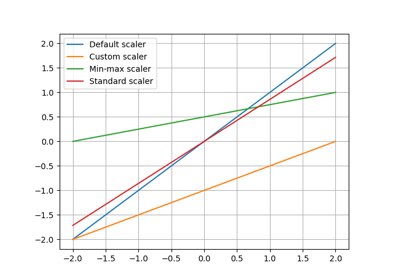min_max_scaler module¶
Scaling a variable with a geometrical linear transformation.
The MinMaxScaler class implements the MinMax scaling method
applying to some parameter \(z\):
where \(\text{offset}=-\text{min}(z)/(\text{max}(z)-\text{min}(z))\) and \(\text{coefficient}=1/(\text{max}(z)-\text{min}(z))\).
In the MinMax scaling method, the scaling operation linearly transforms the original variable \(z\) such that the minimum of the original data corresponds to 0 and the maximum to 1.
Warning
When \(\text{min}(z)=\text{max}(z)\neq 0\), we use \(\bar{z}=\frac{z}{\text{min}(z)}-0.5\). When \(\text{min}(z)=\text{max}(z)=0\), we use \(\bar{z}=z+0.5\).
- class gemseo.mlearning.transformers.scaler.min_max_scaler.MinMaxScaler(name='', offset=0.0, coefficient=1.0)[source]¶
Bases:
ScalerMin-max scaler.
- Parameters:
- compute_jacobian(data, *args, **kwargs)¶
Force a NumPy array to be 2D and evaluate the function
fwith it.
- compute_jacobian_inverse(data, *args, **kwargs)¶
Force a NumPy array to be 2D and evaluate the function
fwith it.
- duplicate()¶
Duplicate the current object.
- Returns:
A deepcopy of the current instance.
- Return type:
- fit(data, *args)¶
Fit the transformer to the data.
- fit_transform(data, *args)¶
Fit the transformer to the data and transform the data.
- inverse_transform(data, *args, **kwargs)¶
Force a NumPy array to be 2D and evaluate the function
fwith it.
- transform(data, *args, **kwargs)¶
Force a NumPy array to be 2D and evaluate the function
fwith it.
- property coefficient: RealArray¶
The scaling coefficient.
- property offset: RealArray¶
The scaling offset.

